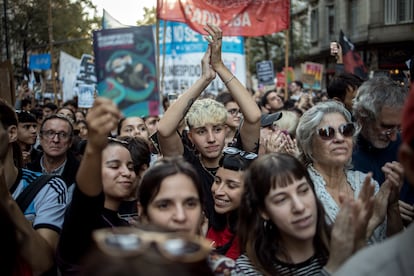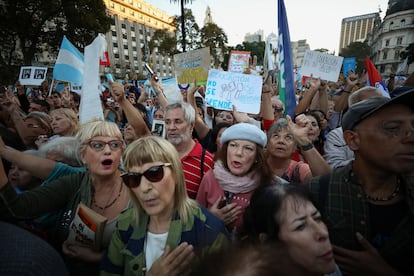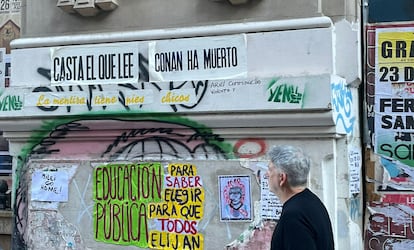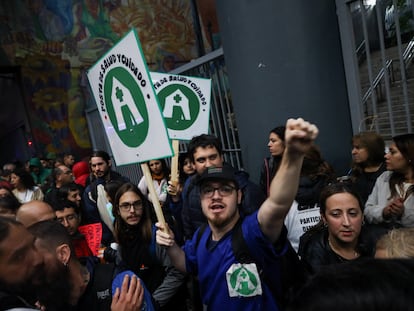Argentina gripped by one of the largest protests in 20 years: ‘Public education is an inalienable right’
The cuts to free public universities triggered mass demonstrations throughout the country, reflecting the growing social unrest surrounding President Javier Milei’s economic policy

The massive marches on Tuesday in defense of public universities in Argentina mark a turning point in the presidential mandate of Javier Milei. During his first four months in power, Milei has made sweeping decisions aimed at eliminating the fiscal deficit and shrinking the state: he has paralyzed public works, closed state agencies, fired tens of thousands of officials, and lowered pensions and salaries. Each new measure has found detractors and backers, but Milei’s privatization agenda seems to have found its first limit: the public university.

In a country wracked by economic crises and political discontent, free public higher education is one of the few pillars still standing. The working- and middle-class cling to it as a way for them to imagine a better future for their children. The images of classes taught in classrooms without light or outside the faculties due to the lack of funds to pay for electricity have outraged both Peronists and left-wing voters — on the opposite side of the political spectrum to Milei — as well as voters from groups closer to the government, including radicals and supporters of former president Mauricio Macri, and even Milei voters who now regret their support.
The smear campaign launched by the far-right government has only worsened the situation. Milei accused teachers of indoctrinating and brainwashing students, arguing they have them trapped in the grips of socialism. He struck a sensitive issue. The president — who graduated in economics from a private university — did not take into account that in almost every family in Argentina there are stories of people whose lives were changed by public education. The country’s free universities are also a source of admiration in the rest of Latin America, especially in countries where one must go into debt for years in order to secure a university education.

Argentine public universities only have enough resources to keep operating until July. Neither students nor professors know if there will be classes in the second semester. Not even the University of Buenos Aires (UBA), the most prestigious in the country, and considered one of the best in Latin America, is free from uncertainty. The problem is that while the budget is the same as in 2023, inflation is approaching 300% year-on-year, meaning universities’ resources have been cut by 70%. The executive tried to stop Tuesday’s protest last week with the announcement of an alleged agreement that the rectors denied. Government spokespersons said that resources had been allocated to cover administrative expenses for March and April. The universities clarified that the problem is in the freezing of teachers’ salaries, which represent the bulk of expenses.
The executive did everything possible to dismiss the protest. Milei tried to present it as a rally organized by the opposition and Public Security Minister Patricia Bullrich said that “the same people as always” would demonstrate, in reference to social and left-wing organizations. But the protest was of a scale and diversity not seen since the 2001-2002 financial crisis. Organizers estimated that 800,000 people marched just in the city of Buenos Aires, a figure that the police reduced to 150,000. The newspaper La Nación put the number of demonstrators at 450,000, based on the analysis of images taken by drones and on the ground.
In the past 20 years since the financial crisis, there have been other mass protests such as the feminist demonstrations in favor of legal abortion and the 2017 protest against a Supreme Court ruling that threatened to decrease jail time for those convicted of crimes against humanity in the Dirty War. The middle class played a leading role in those large protests, and also had an important presence in Tuesday’s marches.
But Milei spent Tuesday retweeting messages from accounts that mocked or attacked protesters. At the end of the day, he posted an image of a lion — the animal with which he self-identifies — drinking a mug of so-called “leftist tears.” His spokesman, Manuel Adorni, however, remained silent. It was up to lawmakers in Macri’s party Pro, which is the main ally of the ruling party Libertad Avanza (Freedom Advances) in Congress, to defend the official line. “Turning the defense of education into a political issue is pitiful as well as untruthful. I will always defend public education as well as private education,” said Jorge Macri, the mayor of the city of Buenos Aires and cousin of the former president, in a message on social media.
Both Milei and Macri have cut funding for public schools while, in parallel, launching initiatives to provide financial aid for parents who send their children to private schools. In universities, the situation is more complex. The UBA is one of the highest-ranking universities on the entire continent and is chosen by students from all social classes. For an impoverished society like Argentina’s, letting it disappear means giving up the desire for upward mobility, which has already becoming increasingly difficult.

Former presidential candidate Juan Grabois warned Milei that his attack on the public university system has led to unprecedented backlash. “What happened in every corner of the country only happens when something moves the tectonic plates of a society. Today was the reaction of a people who, if there is one thing that is clear to them —something that neither the most fiery libertine rhetoric nor their undeniable talent for insults can obscure — is that public education is an inalienable right,” Grabois wrote on social media.
Sign up for our weekly newsletter to get more English-language news coverage from EL PAÍS USA Edition









































